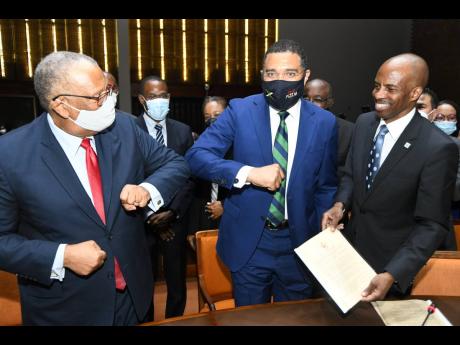Tougher laws coming for mystery wealth
If government ministers are involved in corruption, they will be obliged to resign immediately and Jamaicans who cannot explain how they accumulate wealth could lose their assets to the State. These form part of decisions taken by stakeholders on a National Consensus on Crime.
A memorandum of understanding detailing a raft of decisions on a National Consensus on Crime was signed on Monday by Prime Minister Andrew Holness, Opposition Leader Dr Peter Phillips, civil-society groups, the Private Sector Organisation of Jamaica, among others, at the Jamaica Conference Centre.
The document sets out various priorities agreed on by stakeholders with timelines for implementation.
By the final quarter of 2021, the Government is expected to amend the Proceeds of Crime Act (POCA) to reverse the burden of proof for persons who cannot explain how they get their wealth. This will enable the State to seize assets from persons who obtain their wealth by crime or corrupt means.
The document also states that ministers of government or senators involved in corruption or complicit in graft must tender their resignations.
However, members of parliament found guilty or involved in corruption or facilitating criminal activity are to be “immediately sanctioned by their party”. They should also be subject to criminal charges if deemed warranted by the Office of the Director of Public Prosecutions.
President of the Jamaica Chamber of Commerce, Lloyd Distant, told The Gleaner on Monday that a Consensus Monitoring Oversight Committee will be established by the end of August to ensure that the decisions agreed on are implemented based on stipulated deadlines.
“I anticipate that the committee will use a lot of what was leveraged in this consensus process, in terms of holding the respective political parties, government departments, and agencies and civil society accountable to these agreements,” Distant said.
In his comments, Holness said that public disorder, crime, and violence and limited consequences for breaches of the law have for too long characterised the country’s security landscape.
He saluted the “bravery and perseverance of the security forces” in tracking down some of the country’s most notorious criminals, who have been dealt with within the law. That commendation came just over 24 hours after police and soldiers killed six suspected gangsters in Clarendon.
The prime minister said that the community of Catadupa in St James was under siege by criminals, with operators of public transportation having to pay a toll to criminals.
“The police station there was shot up, the policemen were literally under pressure, afraid, in that community in 2018.”
He said one of the criminals who plagued the community for some time was caught a few days ago “and dealt with within the laws”.
Phillips, in his presentation, drew attention to the tripartite evils of drug trafficking, gunrunning, and scamming. He said that these activities are linked to transnational crimes.
He said that successful prosecution and confrontation of these criminal activities required international cooperation.
“We should be enthusiastic as a country in engaging international partners in this task,” said Phillips.
National Consensus on Crime
• The political parties will repudiate and reject any links to gangs or other organisations that are known or suspected to be involved in criminality.
• Any senator found guilty of involvement or complicity in corruption or of facilitating criminal activity will be immediately obliged to resign and may be subject to criminal charges if deemed warranted by the Office of the DPP.
• Any minister found guilty of involvement or complicity in corruption or of facilitating criminal activity will be immediately obliged to resign as a minister and may be subject to criminal charges if deemed warranted by the Office of the DPP.
• All members of public boards will be appointed solely on the basis of merit, relevant experience, and qualifications.
• All government contractors and subcontractors will be closely monitored to ensure that funds do not reach organised criminal networks.
• Any company that is found guilty of corruption, facilitating or knowingly benefiting from organised crime, or acting as a front for organised crime, will be disbarred along with their principals from bidding on future government contracts.
• We will introduce additional legislation to ensure that attorneys cannot be paid with the proceeds of crime or any other contaminated source of funds.
• We will introduce additional legislation to criminalise all acts designed to facilitate corruption, organised crime, and money laundering, and give courts the power to seize the goods of persons who have facilitated organised crime and money laundering, as well as goods that have been transferred by them to relatives, partners or cohabitants.

